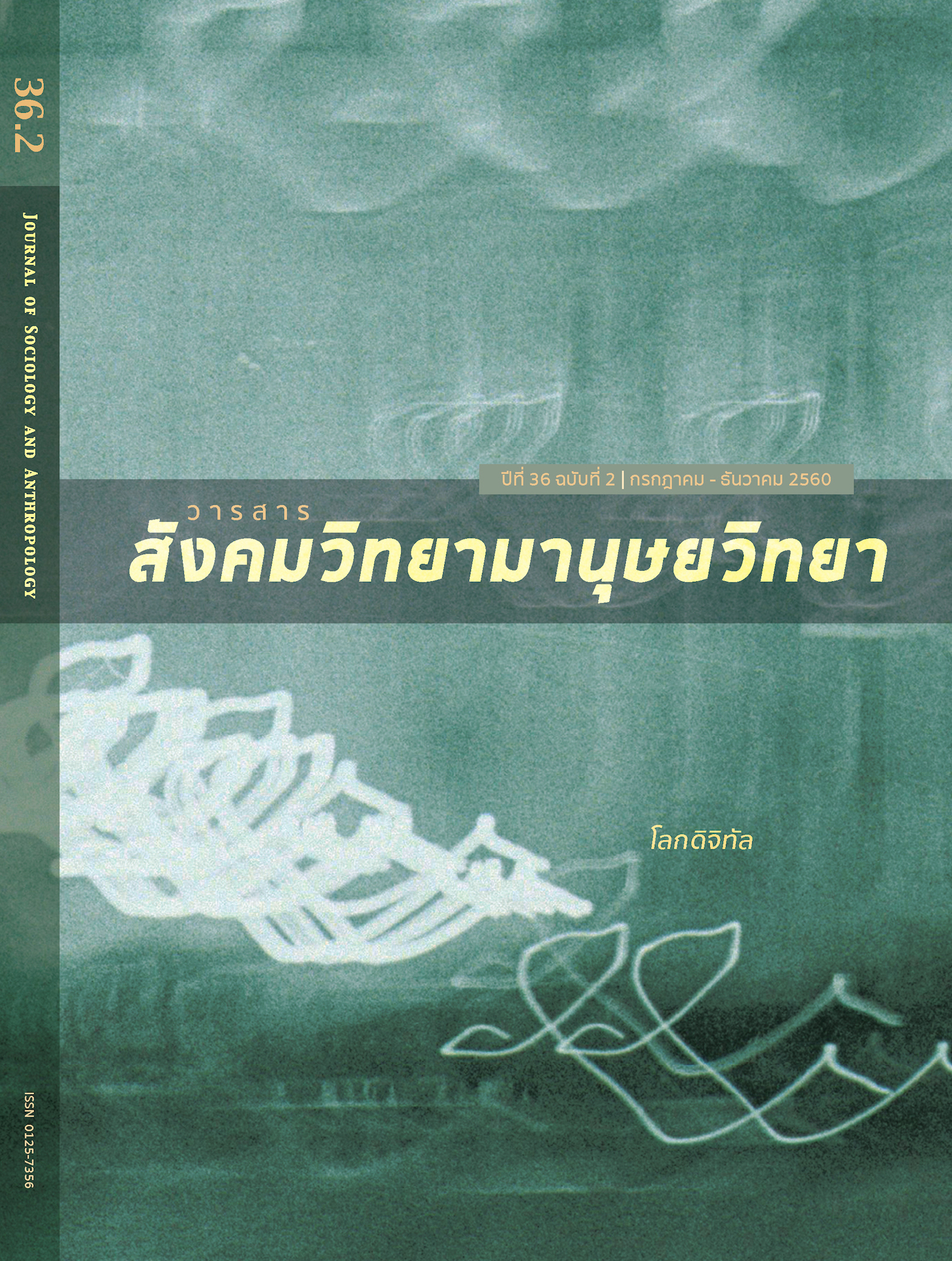cyber civil society in Vietnam today
Keywords:
civil society, cyber activism, Vietnam, digital anthropologyAbstract
Vietnam has recently seen an increasing internet access rate due to the government’s infrastructural and economic investment. This has been as much a better access to news and information for the Vietnamese population as a new challenge to Vietnam’s politics. Drawn from my documentary research and field research in Vietnam between 2015-2017, I argue that the Vietnamese are utilizing the Internet to disseminate ideas and to create socio-political activities that form parts of “cyber civil society” under the country’s totalitarian regime. It is therefore challenging to investigate how political participation and social movements in Vietnam have transformed with the help of cyber activism. On the one hand, this article considers how the Vietnamese government deals with such forms of cyber activism and political participation. On the other hand, it illustrates how Vietnamese social activists develop strategies and tactics to negotiate with state authoritative power, particularly those based on their use of multimodal communication in both online and offline activities.
References
Bui, Thiem Hai. 2016. “The Influence of Social Media in Vietnam’s Elite Politics.” Journal of Current Southeast Asian Affairs 35(2): 89-112.
Castells, Manuel. 2001. The Internet Galaxy: Reflections on the internet, business, and society. Oxford: Oxford University Press.
Castells, Manuel. [2012] 2015. Networks of Outrage and Hope: Social movements in the internet age. 2nd ed. Cambridge: Polity Press.
Coleman, E. Gabriella. 2010. “Ethnographic Approaches to Digital Media.” Annual Review of Anthropology 39: 487-505.
Hannah, Joseph J. 2007. “Approaching Civil Society in Vietnam.” PhD diss., University of Washington.
Jensen, Casper Bruun. 2014. “Continuous Variations: The conceptual and the empirical in STS.” Science, Technology, and Human Values 39(2): 192-213.
Latour, Bruno. 2005. Reassembling the Social: An introduction to actor-network-theory. Oxford: Oxford University Press.
London, Jonathan D., ed. 2014. Politics in Contemporary Vietnam: Party, state, and authority relations. Hampshire: Palgrave Macmillan.
Madianou, Mirca and Daniel Miller. 2013. “Polymedia: Towards a new theory of digital media in interpersonal communication.” International Journal of Cultural Studies 16(2): 169-187.
Miller, Daniel and Don Slater. 2000. The Internet: An ethnographic approach. Oxford: Berg.
Miller, Daniel and Heather A. Horst. 2012. “The Digital and the Human: A prospectus for digital anthropology.” In Digital Anthropology, edited by Heather A. Horst and Daniel Miller, 3-35. London: Berg.
Miller, Daniel and Jolynna Sinanan. 2014. Webcam. Cambridge: Polity Press.
Miller, Daniel, Elisabetta Costa, Nell Haynes, Tom McDonald, Razvan Nicolescu, Jolynna Sinanan, Juliano Spyer, Shriram Venkatraman, and Xinyuan Wang. 2016. How the World Changed Social Media. London: UCL Press.
Poell, Thomas. 2014. “Social Media Activism and State Censorship.” In Social Media, Politics, and the State: Protests, revolutions, riots, crime, and policing in an age of Facebook, Twitter, and YouTube, edited by Daniel Trottier and Christian Fuchs, 189-206. London: Routledge.
Tuan, Tran Minh, 2011. Broadband in Vietnam: Forging its own path. Washington, D.C: infoDev/World Bank.
Wells-Dang, Andrew. 2012. Civil Society and Climate Change in Vietnam: Actors, roles, and possibilities. Hanoi: Pact, Vietnam Country Office.
Wells-Dang, Andrew. 2014. “The Political Influence of Civil Society in Vietnam.” In Politics in Contemporary Vietnam: Party, state, and authority relations, edited by Jonathan D. London, 162-183. Hampshire: Palgrave Macmillan.
Wischermann, Jörg. 2011. “Governance and Civil Society Action in Vietnam: Changing the rules from within—potentials and limits.” Asian Politics and Policy 3(1): 383-411.
เอกสารภาษาเวียดนาม
AdminTD. 2017. “Hoạ sĩ Nguyễn Nhân bị kỷ luật vì tác phẩm Biển chết.” [จิตรกรเหงวียน เยิน ถูกลงโทษทางวินัยอันเนื่องมาจากผลงาน “ทะเลตายแล้ว”]. Tiếng Dân, July 28, 2017. https://baotiengdan.com/2017/06/28/hoa-si-nguyen-nhan-bi-ky-luat-vi-tac-pham-bien-chet/. Accessed December 15, 2017.
Hoàng Nguyên. 2016. “Lời kêu gọi Toàn quốc kháng chiến- tiếng gọi cứu nước.” [“ทั้งประเทศร่วมสู้ศึก” เสียงเรียกให้กู้ชาติ]. Vĩnh Long Online, February 13, 2016. https://www.baovinhlong.com.vn/chinh-tri/201602/loi-keu-goi-toan-quoc-khang-chien-tieng-goi-cuu-nuoc-2665055/. Accessed July 20, 2017.
Trí Tín. 2013. “Nữ sinh bị đuổi học vì xúc phạm thầy cô trên Facebook.” [นักเรียนหญิงถูกพักการเรียนเนื่องจากให้ร้ายครูบนเฟซบุ๊ก]. VnExpress, January 7, 2013. https://vnexpress.net/tin-tuc/giao-duc/nu-sinh-bi-duoi-hoc-vi-xuc-pham-thay-co-tren-facebook-2410133.html. Accessed July 20, 2017.
เอกสารออนไลน์
Freedom House. 2017. “Freedom on the Net 2017: Vietnam.” Freedom House. https://freedomhouse.org/report/freedom-net/2017/vietnam. Accessed July 22, 2017.
Human Rights Watch. 2017. “Vietnam: Free Blogger ‘Mother Mushroom.’” Human Rights Watch, June 28, 2017. https://www.hrw.org/news/2017/06/28/vietnam-free-blogger-mother-mushroom. Accessed December 20, 2017.
Ministry of Information and Communications. 2017. Whitebook of Viet Nam Information and Communication Technology. https://english.mic.gov.vn/Upload/ENGLISH/Statistics/ICT-WHITEBOOK2017-Final.pdf. Accessed November 20, 2017.
Perez, Sarah. 2016. “Facebook Blocked in Vietnam over the Weekend due to Citizen Protests.” TechCrunch, May 18, 2016. https://techcrunch.com/2016/05/17/facebook-blocked-in-vietnam-over-the-weekend-due-to-citizen-protests/. Accessed July 22, 2017.
Reuters Staff. 2017. “Vietnam Police Arrest Dissident for ‘Abusing Democracy Rights.’” Reuters, May 15, 2017. https://www.reuters.com/article/us-vietnam-dissident/vietnam-police-arrest-dissident-for-abusing-democracy-rights-idUSKCN18B1JX. Accessed June 30, 2017.



